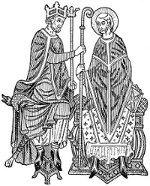Articles
- The world of Chaucer 1330-1400
- Medieval writers
- Key events
- Making sense of the tangible world
- Making sense of the intangible world
The power of the monarch
Medieval societies were not democracies. England was ruled by the king. At the same time, great lords wielded enormous power. Throughout Chaucer's life,  English kings were engaged in a virtually continual struggle for power against the great landowners and nobles — dukes and earls.
English kings were engaged in a virtually continual struggle for power against the great landowners and nobles — dukes and earls.
Richard II tried to centralize administration in certain respects, to bolster his own rule. One method of achieving this was to increase the administrative importance of gentry (knights, franklins, other landowners) in the counties. This meant that the landowning upper-middle class, as opposed to the aristocratic lords, were becoming an increasingly prominent sector in English society, as were merchant elites in towns. The growing importance in society of franklins, knights and rich merchants is reflected in The Canterbury Tales.
There was social unrest in other quarters of medieval society.
See World of Chaucer > Key events > The Peasants' Revolt
See World of Chaucer > Key events > John Wyclif and challenges to the Church
